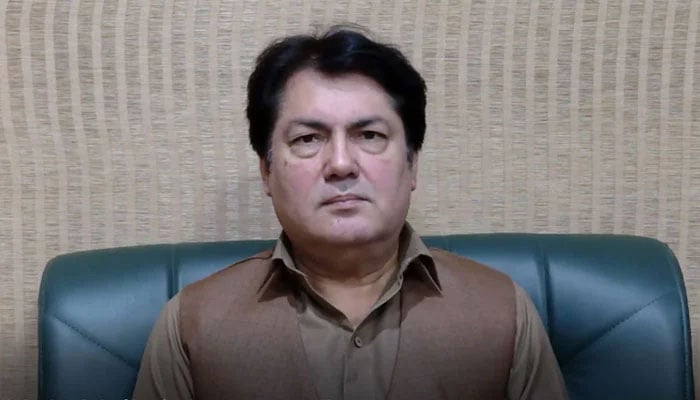Knowledge plays major role in rise, fall of civilisations: Barrister Saif
Annual event provides platform for promotion of culture of research in field of healthcare
PESHAWAR: Adviser to Chief Minister on Information and Public Relations Barrister Muhammad Ali Saif on Sunday emphasized the pursuit of knowledge and research as essential human endeavour and a sacred duty, particularly in the context of Islamic teachings.
Speaking at the International Conference on Health Research 2025, organised by a private hospital in Hayatabad, he said that the quest for knowledge was divinely ordained and played a major role in the rise and fall of civilisations.
The annual event provides a platform for promotion of a culture of research in the field of healthcare. This year, the conference received over 500 research abstracts from Pakistan and abroad, registered more than 2,000 participants, and held over 55 pre-conference workshops.
The conference was conducted in a hybrid format, featuring speakers from Russia, Africa, the United Kingdom and Italy.
Citing the Holy Quran and traditions of Prophet Muhammad (peace be upon him), Barrister Saif said that Muslims are bound to explore the boundaries of knowledge. “Attaining knowledge is a sacred duty. The rise and fall of civilisations is a consequence of how knowledge is used,” he remarked.
He stressed that researchers bear the sacred responsibility of pushing the boundaries of the unknown, guided by reason and rationalism.
Drawing on a Quranic reference to the ever-expanding nature of the universe, he said that constant intellectual inquiry was necessary to uncover unexplored realms for the welfare of humanity.
Tracing the historical evolution of human thought, Barrister Saif referenced philosophical traditions such as historical materialism and dialectical processes, arguing that intellectual progress has been driven by a continuous cycle of skepticism and enlightenment.
The adviser pointed out a persistent gap between research and its practical implementation in developing countries, attributing it to systemic governance failures. “This problem is not limited to healthcare but is affecting all walks of life,” he noted.
He warned against the commercialisation of knowledge, observing that materialistic ambitions overshadow collective moral responsibilities. “We are witnessing a collective mindset shaped more by economic gains than by the spirit of cooperation and human development,” he said.
Barrister Saif underlined the power of progressive ideas in shaping civilisations and called for research that fosters both material and spiritual progress. He said that the Holy Quran repeatedly urged believers to ponder, reason, and understand, emphasizing the duty to use intellect for the greater good.
Speaking on the role of governments, Barrister Saif highlighted recent initiatives of the provincial government aimed at extending healthcare coverage for major procedures including kidney, liver, and bone marrow transplants, and cochlear implants, benefiting economically marginalized segments of population.
The conference brought together leading experts and researchers from across the country to discuss innovative approaches in health research, with an emphasis on bridging the gap between research and its practical application.
-
 Magic Vs Clippers: Clippers Announce Kawhi Leonard Status After Exit
Magic Vs Clippers: Clippers Announce Kawhi Leonard Status After Exit -
 BTC Price Today: Bitcoin Sinks Below $65K On Trade Uncertainty
BTC Price Today: Bitcoin Sinks Below $65K On Trade Uncertainty -
 'A Knight Of The Seven Kingdoms': All You Need To Know About The Finale
'A Knight Of The Seven Kingdoms': All You Need To Know About The Finale -
 NYC Travel Ban: Mamdani Shuts Down Roads Amid Blizzard Conditions
NYC Travel Ban: Mamdani Shuts Down Roads Amid Blizzard Conditions -
 Alicia Keys Celebrates 25 Years Of Breakout Single ‘Fallin’’
Alicia Keys Celebrates 25 Years Of Breakout Single ‘Fallin’’ -
 Akinola Davies Jr. Gives His Immigrant Parents A Shoutout In 2026 BAFTAs Acceptance Speech
Akinola Davies Jr. Gives His Immigrant Parents A Shoutout In 2026 BAFTAs Acceptance Speech -
 Princess Beatrice, Eugenie Told 'first Thing They Should Do' After Andrew Arrest
Princess Beatrice, Eugenie Told 'first Thing They Should Do' After Andrew Arrest -
 Jennifer Garner Reveals What Her Kids Think Of Her Acting Career
Jennifer Garner Reveals What Her Kids Think Of Her Acting Career -
 Prince William Should Focus On 'family Business' After Andrew Blunder
Prince William Should Focus On 'family Business' After Andrew Blunder -
 Katherine Schwarzenegger Pratt 'brought To Tears' By Sister-in-law's Gesture
Katherine Schwarzenegger Pratt 'brought To Tears' By Sister-in-law's Gesture -
 Prince William Makes Bold Claim About Britain's Creative Industry At BAFTA
Prince William Makes Bold Claim About Britain's Creative Industry At BAFTA -
 Andrew Mountbatten Windsor Insulting 'catchphrase' That Degarded Staff
Andrew Mountbatten Windsor Insulting 'catchphrase' That Degarded Staff -
 Kate Middleton, Princess Beatrice 'undercurrent Tension' Comes To Surface
Kate Middleton, Princess Beatrice 'undercurrent Tension' Comes To Surface -
 'Grey's Anatomy' Alum Katherine Heigl Reveals Why She Stayed Silent After Eric Dane Loss
'Grey's Anatomy' Alum Katherine Heigl Reveals Why She Stayed Silent After Eric Dane Loss -
 Host Alan Cumming Thanks BAFTAs Audience For Understanding After Tourette’s Interruption From Activist
Host Alan Cumming Thanks BAFTAs Audience For Understanding After Tourette’s Interruption From Activist -
 Jennifer Garner Reveals Why Reunion With Judy Greer Makes Fans 'lose Their Minds'
Jennifer Garner Reveals Why Reunion With Judy Greer Makes Fans 'lose Their Minds'




